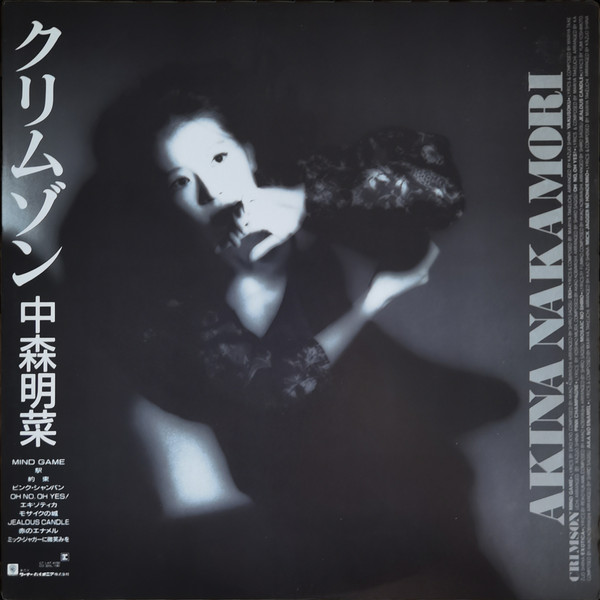Why Mariya Takeuchi's Version of "Oh No, Oh Yes!" Sucks Ass
I had the idea for this essay for... years, I think. I initially wanted it to be my first youtube video but that idea was thrown out because I hate exposing myself, so I'll use this blog for my youtube ideas now. I'll try to make this as textual as possible, so bare with me on this one.
In 1986, after releasing her most artistic and experimental album to date, Akina Nakamori was caught up on the flow and decided to make yet another album, but this time, slightly less experimental. She got in touch with Akiko Kobayashi and hugely acclaimed singer/songwriter Mariya Takeuchi, to write the songs, and two arrangers (Shiro Sagisu and Moonriders's Kazuo Shiina) to help in the album. Kobayashi composed 5 of the songs (with lyrics by other female writers) and Takeuchi wrote what is arguably the "meat" of the album, with one track in particular being easily my favorite song in Akina's entire discography: Oh No, Oh Yes.
Later, in her album Request, Mariya covered Oh No Oh Yes, and... basically ruined the song. She turned it from a deep layered emotional whiplash to a mindless dance tune. But to understand why this matters, we first have to understand what makes the original so great.
We open with a drum beat. The most shocking and sudden drum beat I'd heard to that point, and still one of the best introductions I've ever heard. Then, amidst the waves of reverb, a whole bunch of instruments in perfect harmony, and in the center of it all, a synth lead with (arguably) the best riff in Japan's pop history. That's the first hint of the song's ethos: all of this is a highly emotional afterthought. Something intense, but fleeting. The lyrics haven't started, but you can already feel a sense of lust and secrecy.
Akina starts singing. The lyrics, courtesy of Ms. Takeuchi, exude a clear mastery in songwriting, as the narrator states her current situation which perfectly matches Akina's whispery singing from Crimson. She is on her way to meet a lover, in secret. She is hiding this affair from the public eye and from her husband, appearing to be strong, but "in her heart she is shaking from all the pain". That's why she whispers.
However, while she is whispering the lyrics as to hide her affair, the instruments in the background show you how she is truly feeling: Bombastic. An explosion of emotions. Worryness, regret, love, lust, fear. The narrator feels lost and even hypocritical, so she collapses over her lover's chest and breaks down crying.
If I had to describe this song, I would say it is Cognitive Dissonance. Her voice shows one thing, but the instrumentals and lyrics show another. It is thematically "dissonant" in a beautifully harmonic way.
(Sidenote: I like to believe that Oh No Oh Yes and Yakusoku have the same protagonist, and that the person she's calling on that song is the lover from this one. I also like to believe that this is all linked to Tim Maia's Telefone somehow.)
Now let's take a look at Mariya's version, from Request.
It starts with a boring, standard and raw drum machine. When the beat drops, you can already notice the difference in emotion. While Akina's version hits you with a brick in your head, this one is caressing you and asking you to dance. Not necessarily a bad thing, right? It could work, especially in the context I just layed on you, where you could argue the narrator is dancing to forget her problems.
You can also notice the absence of that iconic synth riff, replaced by a simple pad and some bells. Still, not that bad, as it is admitedly a simpler version of the original song.
Then she starts singing.
She starts oversinging it.
Akina was trying to sing in the most modest and natural way possible to complement the rest of the music, while Takeuchi oversings every line to overcompensate this emotionless husk of an instrumental.
There is no emotion whatsoever. And again, that would be fine to me! If the production wasn't so bare bones, sounding like a poor man's Phil Collins, and if the song had more stuff going on. It's literally just that: The boring drum machine, the boring pad, some backing singers giving their best but unfortunately sounding half asleep, the previously great lyrics (which now doesn't sound like anything more than a B-list Tatsuro Yamashita song) and Mariya's boring oversinging voice.
THE POINT
I wouldn't hate this song if the original wasn't one of the best things to ever come out of Japan's pop music. It's a pointless vanity project, a way for her to claim the song as hers. She wrote it, so that means it was good because of her, right? Well, no.
Arrangement, production and vocal delivery are what turns a decent song into a legendary one. Akina had the whisdom to let everyone involved shine alongside her and the virtuosity to pull of the emotional layers, but Mariya Takeuchi took the lead role and didn't even know what to do with the song. She basically made the version just to fill space.
More than anything, it's a cautionary tale and a good lesson in songwriting. It actually helped me a lot with my critical thinking in music, making me realize all the profoundness of the original song. So, ultimately, I think the world is better with it existing.



Comentários
Postar um comentário